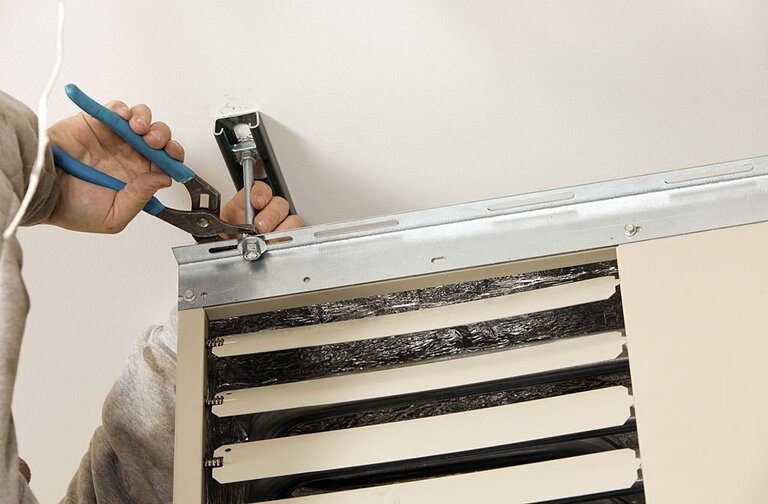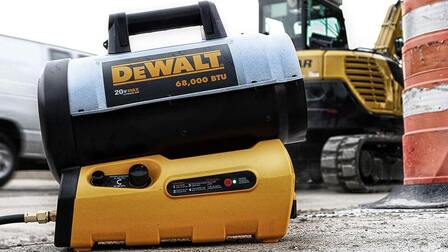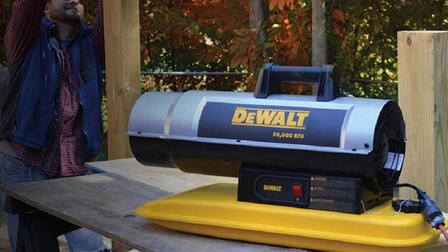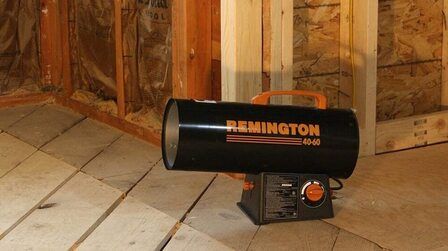If you’re investing in a garage space heater, you should familiarize yourself with its maintenance as early as possible. Each model on the market has different requirements in this regard. Some are very easy to clean and maintain while others require more attention and, in some cases, even specialized skills.
One important factor for any good jobsite heater is that it should be as easy to maintain as possible. This includes keeping the heater clean. Unfortunately, not all models on the market are that simple.

Why Do You Need to Clean Your Space Heater?
Cleaning your space heater will prevent malfunctions. If enough dust and debris build up over time, this could create a fire hazard. That’s why you’ll often see a recommendation to thoroughly clean your heater before turning it on if you haven’t used it in some time.
A dirty space heater can also emit an unpleasant smell once it’s turned on. As the accumulated dust burns up, the entire room will be filled with a noticeable smell that can be difficult to get rid of.
Depending on the kinds of debris that have gathered over time, you may even be creating a health hazard. Some materials can emit toxic fumes when exposed to high temperatures.
How to Clean the Dust Out of Your Garage Heater
Knowing how to clean the garage heater you’ve chosen before you’ve even bought it can save you a lot of trouble when the time for the first cleaning session comes. Every space heater for garage and jobsite use has slightly different requirements for its cleaning, but the general idea is the same across the board.
General Guide
Before you begin, it’s a good idea to wear facial protection. Once you’ve started cleaning your heater, there will be a lot of dust in the air. Even if you take it outside you may still be exposing yourself to an unnecessary hazard.
Always unplug the heater and allow it to cool down for some time before you start cleaning it. If you don’t have easy access to the power plug (which can sometimes happen with mounted heaters secured in an awkward spot), you should shut off the power directly at the breaker.
A vacuum cleaner with a thin nozzle attachment can be very useful for getting the dust out of tricky spots. Make sure that there are no loose parts that can get sucked up by the vacuum.
It may seem counterintuitive, but a hair dryer can also come in handy for getting the dust out of those hard-to-reach areas. Make sure there’s enough space on the opposite side of the heater and just run the dryer through all those cracks that you can’t reach with the vacuum cleaner. This will force the dust out of the other end. The heat from the dryer shouldn’t damage any of the garage heater’s components. After all, they were designed to withstand even higher temperatures during the regular operation of the heater.
1 - Cleaning a Radiant Heater
Avoid using water for cleaning a radiant heater. If you have to, make sure that the cloth is barely damp and not really wet, and give all surfaces a thorough wiping with a dry cloth once you’re done. You don’t want to leave any water residue at all on any of the heating components.
If your radiant heater uses a reflector plate, it’s important to keep it as clean and shiny as possible at all times. This will improve the effectiveness of the heater and will avoid wasting power.
2 - Cleaning a Convection Heater
Water is okay for cleaning a convection heater, as long as it’s been completely disconnected from the power supply. Don’t worry if you’re unable to dry the heater completely after cleaning it, as small amounts of water residue won’t really present any risk as long as they’re not close to any electrical components.
Be careful with heat! Convection heaters are usually cold to the touch on the outside, even when they’re actively working. It can be difficult to gauge the internal temperature of your heater after turning it off. To stay on the safe side, wait for at least an hour after unplugging the heater to ensure that it’s cooled down.
3 - Cleaning a Forced Air Heater
Cleaning a forced air heater follows the same steps as with a convection model, with one major difference. You must pay special attention to the fans and grill. Ensure that nothing is obstructing the airflow. Even small obstructions can degrade the efficiency of your space heater significantly.
Tips for Maintaining Your Garage Heater
Here are some tips for maintaining a garage heater that should help you stay safe when using and cleaning your model. Remember, each model will have some individual requirements in addition to those, so make sure to familiarize yourself with the specific requirements of the one you’ve bought.

1 - Allow the Heater to Properly Cool Down Before Cleaning It
Never clean a jobsite heater while it’s still hot. This can be tricky with some convection models, which are often designed to be safe to touch even when they are working. To be sure that your heater has cooled down properly, give it at least an hour after turning it off.
Even then, be careful during the disassembly process. Be prepared for the possibility of coming across an unexpectedly hot part. To avoid damaging the heater or harming yourself, do the disassembly in a place where you can easily drop what you’re doing and back off without any risk. A simple workbench should suffice, as long as it can withstand the full weight of the dryer without any danger.
2 - Avoid Using Extension Cords
Most electric garage heaters draw a lot of power. Avoid using an extension cord and always plug the heater directly into the power outlet when possible. This will minimize the risk of any accidental fires caused by a poorly designed extension cord. Some extension cords are designed for heavy duty use and can be used without risk.
But unless you’re willing to spend extra money on such a model, you should just stick to using the power outlet directly. If you’re using the heater in a larger garage that requires you to move around a lot, a heavy duty extension cord can be a worthwhile investment.
3 - Never Obstruct the Heater
No matter what type of space heater you’re using, you should never create any obstructions around it. This includes covering the heater with a towel, leaving boxes scattered around it, or worse, closing one of its exhaust ports for whatever reason.
Obstructing your heater while it’s in use can cause problems ranging from damaging the heater to starting a fire. Radiant models are particularly prone to such incidents due to the way they operate.
In fact, some radiant heaters can even start a fire from a distance if they’re kept pointed towards a flammable object for too long. Even if the heater doesn’t seem to emit that much heat, it can easily create a fire hazard if pointed towards something particularly prone to catching fire.
4 - Only Use Manufacturer-approved Replacement Parts
If you need to do any repairs on your garage heater, you can usually find cheaper alternatives for many of its components on the market. You should avoid using those though. Only work with parts specifically approved by your heater’s manufacturer and follow the exact instructions for their installation.
This only concerns major parts like the heating elements, fans, and the control unit. Small parts like nuts and bolts are usually interchangeable. Be careful with cables though – those should still be purchased from the manufacturer if they sell replacements.
It’s possible that some of the cables used in your space heater are specifically designed to withstand higher temperatures. Replacing them with ordinary ones can lead to problems, including creating a fire hazard.
5 - Don’t Use Harsh Chemicals for Cleaning Your Garage Heater

Only use water and soap for wiping down any surfaces of your garage heater. Don’t use harsh cleaning chemicals, especially on any of the heating elements. This could negatively affect the materials and cause them to degrade faster over time. In some cases, it could even compromise the safety of your heater altogether.
Check with the manufacturer if there are any specifically approved cleaning products that you can use. Not all garage heater manufacturers provide this kind of information. Sometimes you might have to dig more deeply to figure out what’s okay to use and what isn’t. When in doubt, err on the side of caution and don’t use anything that could potentially lead to problems.
6 - Unplug the Heater When It’s Not in Use
If you’re planning to leave your garage heater unattended for a longer period of time, make sure to unplug it first. It doesn’t matter if you’ll only be gone for a couple of days or several weeks, it’s never a good idea to leave a garage heater plugged in unattended for too long.
Even if the heater itself is in order, you never know when you might have an unidentified problem with your home’s wiring. A fire that starts from a space heater can quickly turn into a major problem, especially if you have flammable materials in the room around the heater.
7 - Have a Regular Cleaning Schedule
You don’t have to take apart and clean your garage heater every week. In fact, that’s not advisable as it may shorten the lifespan of the device if you’re not careful. Once a year should be more than enough for most models on the market. Just make it a point to clean your garage heater on a regular basis and pay attention to any signs of possible problems.
If possible, take notes to track the condition of the heater between each maintenance phase. This will help you with questions like “was this problem already there the last time?” and will allow you to focus on the most concerning issues. A simple notebook with dated entries should be enough for this.
8 - Check for Rust Frequently
Rust should be treated immediately as soon as it’s discovered. Otherwise, it can start to degrade the integrity of your space heater and may even impact its performance at some point.
Depending on how severe the problem is, sometimes you might have to write off that heater as a loss if you didn’t manage to catch the rust in time. That’s why it’s recommended to perform regular maintenance on your garage heater. This will maximize the chance of discovering such problems before they become too serious.
Conclusion
Taking the time to learn how to maintain your garage heater before you start using it can prevent headaches down the road. Most garage heaters are easy to use, clean and maintain, as long as you follow all manufacturer recommendations.
Most importantly, don’t use cleaning agents that have not been approved by the original manufacturer, and don’t be tempted to cut corners in your budget by buying low-grade parts from unapproved sources.





